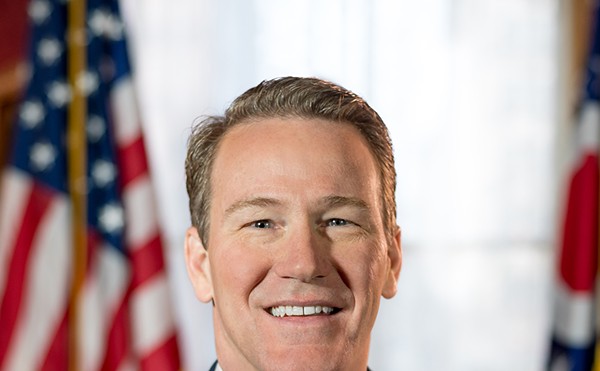|
S tate Rep. Bill Seitz (R-Green Township) cut his teeth on The National Review, perhaps the leading conservative journal in the country. By the sixth grade he'd read Barry Goldwater's The Conscience of a Conservative. In many ways, he personifies the "West-side conservatives" that drive Cincinnati liberals crazy.
But in at least one regard, Seitz — a former member of the Cincinnati School Board and the Green Township Board of Trustees — is an uncommon politician, more interested in public service than political power plays.
"I think the Democrats realize that I'm not staying awake night and day trying to figure out ways to screw them over," he says. "To me, that's part of politics, but that's the part I leave to others."
Some in Cincinnati community once dubbed Seitz a racist, and the gay community is still smarting over his stance against gay marriage. But almost to a man or woman, even his natural born enemies — Democrats — admire the man and his abilities.
House Minority Leader Chris Redfern (D-Catawba Island Township), who rivals Seitz in the candor department, likes the guy. Although he, maybe jokingly, called Seitz a "pain the ass" a half dozen times in one conversation, he says Seitz is a man with uncommon intelligence and an uncanny knack for reaching across the political divide to broker deals.
"He's a pain in the ass, but he's a smart pain in the ass, and I respect his talent, his ability to defend an argument, to defend his position," Redfern says. "It's something a lot of members admire, including myself."
Redfern describes Seitz as an "old school" Republican who makes debate in the Ohio House meaningful in ways that have tended to be foregone in recent years.
"He reminds me of the Republican Party of my father, Republicans who cared rarely about the growth of state government, Republicans who used to care about the influence that government has in all of our lives," Redfern says. "Bill's less likely to have a conversation about social issues and more likely to have a conversation about conservative philosophy. Recognizing, however, that he carried the DOMA (Defense of Marriage Act) bill a couple years ago — we're all entitled to our transgressions — but for the most part Bill reminds me of an old-school Republican politician."
Redfern is never shy about lambasting legislators in the majority party for all their heinous acts, but it seems Seitz isn't too big an offender.
"I believe in a strong and vibrant two-party system and I want to engage colleagues across the aisle in a debate based on politics," Redfern says. "Bill is always able to carry on that debate, and he knows how to separate himself from the issue."
Ungrateful gays and noisy blacks
Others however, speaking of DOMA, find Seitz to be patently superficial on the matter of equality for homosexuals and other issues. Cincinnati gay rights attorney Scott Knox, who did sort of a point/counterpoint session with Seitz both in The Cincinnati Enquirer and on the radio when Seitz proposed DOMA, says he doesn't know for sure what prompted Seitz to take up the issue, but he has a few ideas.
"I think you'd have to characterize the mini-DOMA as anti-gay, because it really doesn't do society or Ohio any good, and I think deep in his heart Bill knows that," Knox says. "So you start to wonder why is someone going after this, and the only thing I can come up with is you dance with them that brung ya, that it's payback to the people that helped him with his campaign."
Seitz tried to couch the legislation in economic terms, arguing that sanctioning gay marriage could break the Social Security and other government banks. But it was a disingenuous argument, according to Knox.
Seitz says he's not at all ashamed he backed the marriage bill.
"The gay marriage issue was one bill and frankly I didn't view it as being that radical, because 37 other states had already passed statutes dealing with whether their state would have to recognize gay marriage," he says. "We were just catching up. I did, however, have grave reservations about the constitutional amendment. I think the gay groups realized, once they saw the extremely broad language in the constitutional amendment, just how fair I had been with them with the very narrow language of the statute."
With DOMA already on the books banning gay marriage, the amendment to the Ohio Constitution, passed by voters in November 2004 as Issue 1, was superfluous, Seitz says. What's more, he feared constitutional and further repercussions of the broad language in the amendment (see "Spreading Cincinnati's Intolerance Statewide," issue of Oct. 13-19, 2004).
Those concerns have already turned into reality. Some smart solicitors in Cleveland have applied the new amendment in a domestic violence case, saying the charges against their unmarried clients ought to be thrown out because only married couples are protected under the new amendment defining marriage (see Porkopolis, issue of Feb. 2-8).
Seitz briefly carried the epithet of a racist when he was on the Cincinnati School Board from 1990 to 1993. Some critics even called for his resignation over remarks he'd made criticizing African-American families' behavior at a commencement ceremony at Western Hills High School.
Sitting in his law office high above the city at Taft Stettinius & Hollister, the usually amiable Seitz turns a bit annoyed when reminded of the controversy. He believes his words in a letter to the school board's attorney were twisted to taint him.
In 1992 the school board was under a federal court order to do a study of, among other things, why African-American students were disproportionately disciplined compared to whites.
At the graduation, Seitz observed that some of the families of the graduates, although they'd been asked to refrain from applause until all the names were read, were unable to contain themselves.
"It was very interesting that the rule was broken by the families of the graduates in a racial proportion that mirrored the disproportionate rate of discipline for black and white students," he recalls. "So I simply wrote a letter to our attorney, who was John Andrew West, with that comment, which somehow was leaked and spun out of all proportion."
His point, Seitz says, was simple: Why should the cash-strapped school district hire consultants to perform a study, when they could have taken the federal judge who ordered the study to a graduation so he could see the phenomenon for himself?
In typical Seitz fashion, after having considered the minutiae of all the angles of the problem, he concluded that the judge needed not to just blame the teachers and school board for the problem but to reach further into cultural considerations. Critics twisted his words, he says.
"We had been ordered to view this through a racial lens," he says. "I didn't dream this up. This was in that context, but of course that was all lost in the equation. It had nothing to do with 'black people shouldn't be allowed at graduation.' "
Another one of Seitz's colleagues in the Statehouse has witnessed racial bias firsthand, so one might guess his radar would be pretty honed to the taint. When discussion at the Statehouse turned to ratifying the 14th Amendment to the U.S. Constitution, which grants blacks citizenship and the right to vote — a little oversight by the state's forefathers — State Rep. Tim Grendell (R-Geauga County) voiced a blatant racial slur about Sen. Mark Mallory (D-West End), in effect calling him stupid.
Nearly everyone in the Statehouse took that as an undeserved sucker punch, and Grendell apologized to Mallory. Given that backdrop, Mallory should be able to spot a racist in the General Assembly. But he has nothing but praise for Seitz's sense of equality.
"I can only speak from my experiences with him, but I know he's not a racist," Mallory says. "I know he is opinionated, he's not shy about telling people his views. Does that mean he's a bad person? He's not."
Conservative even as a kid
Mallory makes it abundantly clear that he and Seitz have serious philosophical differences. But in terms of working to bridge those gaps, he says Seitz is a champ at getting people to look at all sides.
Seitz had his hands all over the latest controversial piece of state legislation — tort reform — once it hit the House, and in the process he almost looked like a Democrat. Working with State Rep. Scott Oelslager (R-Canton) and former House Speaker Larry Householder (R-Glenford), he hit the breaks on the freight train the Senate Republicans had approved, forcing an 18-month vetting of the bill.
When asked about Senate Bill 80, Seitz points to his head at weird spots where his hair is falling out and attributes the phenomenon to his efforts to re-craft the law into something constitutional.
The Ohio Senate passed a draconian piece of punishing tort reform that had tentacles on nearly every aspect of the civil justice system, including capping non-economic damages — catastrophic or minor. Seitz argued it was clearly unconstitutional and sought solutions.
The end product might still not pass muster, but not for lack of trying. Interjecting some provisions he culled from sample legislation by a national think tank of legislators, Seitz cajoled Senate Republicans into agreeing to no caps on catastrophic damages.
Interestingly, Seitz explained his actions on S.B. 80 as "doing a service" for the business community.
"It does them no good to get something through the legislature just the way they want it only to have the entirety either dismissed by the Supreme Court or taken to the voters via referendum," he says.
The way these things usually work is the referendum question would have to be answered in the affirmative, to affirm the legislature's passage of S.B. 80. For advocates of tort reform, that would almost ensure defeat.
"The oldest trick in the book is you always want to be on the no side, because voters, when in doubt, say no," Seitz says.
He said lawmakers learned that lesson on workers' compensation reform in the mid-1990s, when voters struck down reforms the business community wanted. Trial lawyers and organized labor led a referendum to overturn the "reform."
When the tort bill came from the Senate, it even included particulars that are definitely un-Republican, such as a provision that limited what attorneys can charge their clients, according to Seitz.
"Last I checked, we're Republications and we don't believe we should interfere with private contractual decisions, whether it's between an attorney and his client or Procter & Gamble and Gillette," he says.
Seitz considers S.B. 80 and other legislation he has "handled" — not so much introduced or sponsored — to be his most important work to date. But what really gets this legislator juiced is talking about things he accomplished early in his political career as a Green Township Trustee.
"It was a coincidence that my tenure there coincided with flush times for government generally, and we were able to do an awful lot of great things out there," he recalls, ticking off such accomplishments as building a community center, grabbing green space, aggressive road projects and other small government amenities the township could tout in the 1990s.
A woman who asked not to be named likened watching Seitz work in the small pond atmosphere of Green Township to "watching Michael Jordan play at the local YMCA."
His fellow township trustee, Tony Upton, likewise calls him a "superstar" and notes that, as such, many people misunderstand Seitz. Because he makes no bones about his conservative leanings, he is sometimes stereotyped, according to Upton.
"Bill is very conservative, and people take that as a negative," Upton says.
But the politician in Seitz also makes him very approachable and no one works harder to come up with innovative solutions, Upton says. The only time people should be wary is if they cross him, such as the racist rendering people painted of him.
"He wants the truth and he doesn't want a lot of bullshit getting out," Upton says. "If you're going to go after Bill, he's going to come back at you and straighten the record out."
Rodney Watts, a schoolmate from Western Hills High School, doesn't paint Seitz in such glowing terms. During the youth movement of the 1970s, Seitz was the odd man out of everything, according to Watts.
"I'm sure to this day if you mentioned my name his blood pressure would go through the roof," Watts says. "I cut him off at the knees at every political altercation we had. But that was a different era, back in '69, '70 and '71, and I was a dyed-in-the-wool liberal. It was interesting. Bill was not a well-liked person and was maladjusted in certain ways. But he's very clever and he sensed that there were all these people on the left side of the political spectrum and there was nobody over there on the right, so he quite adroitly positioned himself in that quadrant. He didn't succeed back then but, of course, as we all know now, that strategy paid off in the long run."
Watts recalls that back then the left ruled in high school politics. He had the youth platform of trying to get dress codes abolished and other attractive campaigns of the movement and admits he was a good fund-raiser, something Seitz abhors to this day.
'He'll chew on you'
That's one of the reasons Seitz hasn't positioned himself to ascend in party leadership. He doesn't have visions of the speaker's chair or any other elevated position, except for a State Senate seat once the sun sets on his term in the House four years from now.
Fund-raising is a major function of party leadership and even more so when seeking statewide office. Groveling for the green holds no allure for Seitz.
"I have made no secret about my desire one day to be in the Ohio Senate," he says. "I have no real desire to do anything statewide, because if you do that you're back into the 24/7 money raising routine. And Congress doesn't really excite me, because when you get right down to it Congress doesn't really do very much. To be one of 435 representatives — I know how hard it is to get something done as one of 99. I think it would be very frustrating for someone like me who likes to get things done. Just talking about it doesn't do much for me."
Seitz won again handily in 2004, and Redfern is resigned to the fact that the 34th District will be his to represent for the duration, which isn't all bad, according to the candid Democrat.
"It's a tough seat to win with Seitz having it," Redfern says. "This is an engaging guy, this is a likeable guy. He's a Lyndon Johnson type of politician. He'll mosey right on next to you and chew on you until he gets what he wants, and he is an effective legislator in the process. And he's a pain in the ass. He adds to the vibrancy of the nature of the House and I respect him a great deal, I admire his tenacity. I'd rather we had a Democrat representing that seat, but in the meantime I'll take Seitz."
As for moving to the Senate in four years? Mallory says the Senate will be lucky to get Seitz, assuming he can unseat newly elected Sen. Pat Clancy.
So what do people on his own side of the fence think? He's certainly not a lock-step party man. Newly named House Speaker Jon Husted (R-Kettering), who appointed Seitz co-chair of the newly formed Policy Committee, sings his praises.
"I consider him one of the brightest people you could ever meet or have the privilege to work with," Husted says. "As a Republican, he is conservative but he is not ideological, meaning his values are conservative. But he doesn't let labels prevent him from thinking what the best solution to the problem might be at the time."
That seems to be the core of Seitz's conservatism. While he is a religious man and attends church most Sundays, his is not a faith-based ideology. His political ideology seems to focus on constitutionality and practicality. He recently said, for example, that he wouldn't oppose legalizing marijuana for medicinal purposes in Ohio except for the fact that federal law makes it illegal (see "Toking the Cure," issue of March 2-8).
While he wears the badge of a conservative Republican, he doesn't always agree with higher-ups in the party.
Take Gov. Bob Taft, for example. Seitz worked with him at Taft Stettinius & Hollister several years ago. The governor sometimes gets the bum wrap of being a bumbling bubblehead, according to Seitz, but Taft is really an intelligent, thoughtful fellow who has a tough job at the moment.
His fundamental disagreement with Taft is the governor's opposition to expanding gambling opportunities in the state. Seitz also isn't fond of the governor's penchant for pressing sin taxes, especially in border counties, where it's cheaper to go to Indiana or Kentucky for liquor and cigarettes because of the lower taxes in those states.
Seitz also believes Taft has maintained a blue-blooded aloofness that has made it hard for the public and legislators to penetrate and work with.
"He has a bit of a 'goody two shoes mental block' on that (gambling) subject," Seitz says. "I've known Bob a long time and I think he's misunderstood by the general public, who think of him as a fumbler. But he's actually quite bright and quite well meaning. He is just dealing with very difficult problems brought on by Ohio's changing economy."
Likewise, Seitz generally agrees with President Bush's direction for the country, but he isn't just a passive party man. He says he's confused and concerned, along with many people, about the failure to find any weapons of mass destruction in Iraq.
He generally agrees with what he calls Bush's "peace through strength message." He also approves of Bush's tax plans and credits him for boldly attacking the Social Security issue.
Still, he says and he and his like-minded constituents in ultra-Republican Green Township think Bush is doing OK, but he's no Ronald Reagan.
"I preferred Reagan," Seitz says. "I think he was a little bit more genuine and somewhat of a revolutionary. But President Bush has had a lot to grapple with in the wake of 9/11."
Seitz attended one of Bush's inauguration soirées and was highly unimpressed. It was crowded, and Bush and his wife danced only a half-dance before leaving. All in all, Seitz says he would have rather stayed home.
Regardless of his opinions on political hot potatoes such as gay marriage, Seitz says he is focused on problems, not on politics.
"I am more interested in how to solve the problems and deal with issues than launching any type of personal political crusade," he says.
Seitz seldom issues press releases and doesn't maintain a Web-based tribute to his accomplishments.
"The old-school political folks believe this is more about public service than their own personal aggrandizement," he says.
Cultivating more than legislation
Seitz isn't the only prominent Cincinnatian with that name. There is also Bill Seitz, gallery director at the Carnegie Visual + Performing Arts Center in Covington. The two men haven't met, but they know of one another.
The political Seitz takes ribbing from associates who express mock surprise at learning of his hidden artistic side. The artistic Seitz sometimes catches hell from people who mistake him for the man behind DOMA.
Last year Seitz the gallery director toyed with the idea of running a newspaper ad announcing, "Bill Seitz is gay," but decided against it (see "Porkopolis," issue of Feb. 4-10, 2004).
Seitz's personality differs little from his political persona, according to Jim Huhn, a friend of 30 years who worked with Seitz on the Westwood Civic Association.
Seitz "does more in a half hour than most do in five," Huhn says. He also knows how to have a good time, will come out and change your flat tire and is loyal to a fault. He's a good friend, Huhn says.
Seitz and his wife Diane have been married for almost 27 years, and Seitz counts that as one of his best accomplishments. Diane Seitz, who says she doesn't care a whit for politics, says it's a good thing she's comfortable spending time by herself, given her husband's hectic schedule.
Politics is obviously his passion but gardening also gets him going, his wife says. His grandfather had a tomato farm, and a green thumb was apparently inherited.
"He grows little plants in our basement," Diane Seitz says. "We have grow lights in there and he transplants the little seeds and he watches them grow and he gets all excited when they come up."
Seitz also likes to hit the links with his two grown sons, Andy and Brad. But when they were little, his wife says, he never had a penchant — or the time — for potty training their two sons. But when the father figure was needed, no matter his schedule, he was there for them.
These days Seitz spends more than half the week in Columbus and at speaking and other political engagements. With what's left, he practices anti-trust law. He says his partners are "nice to keep him" around.
Thomas Heekin, the managing partner at Taft Stettinius & Hollister, says Seitz's legal persona is equal to his political face and that he's an ardent advocate for his clients.
"What we all say is it is a part of our firm's history to be in public service and Bill's the guy who happens to be doing it at this particular time," Heekin says. "To the extent that he does it well, that he is highly regarded in the legislature, then that is good for the firm." ©





